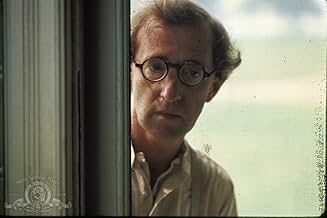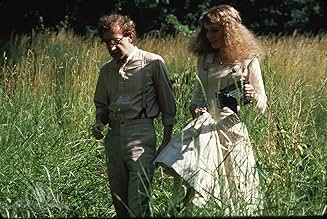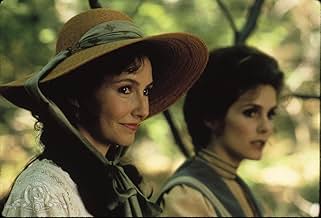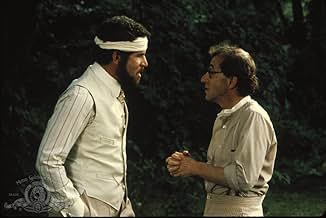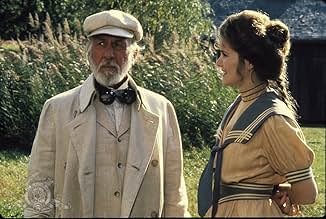Comédie érotique d'une nuit d'été
Titre original : A Midsummer Night's Sex Comedy
- 1982
- Tous publics
- 1h 28min
NOTE IMDb
6,6/10
22 k
MA NOTE
Au cours d'un l'été au début du XXe siècle, un inventeur loufoque et sa femme invitent deux autres couples pour le week-end dans leur maison de campagne romantique.Au cours d'un l'été au début du XXe siècle, un inventeur loufoque et sa femme invitent deux autres couples pour le week-end dans leur maison de campagne romantique.Au cours d'un l'été au début du XXe siècle, un inventeur loufoque et sa femme invitent deux autres couples pour le week-end dans leur maison de campagne romantique.
- Réalisation
- Scénario
- Casting principal
- Récompenses
- 1 nomination au total
José Ferrer
- Leopold
- (as Jose Ferrer)
Sandy Biano
- Nurse
- (non crédité)
Caitlin O'Heaney
- Dolores Farrar
- (non crédité)
Avis à la une
First,i should say that i am an inconditional Woody Allen fan. I saw this movie for the first time yesterday and i had a GREAT time! Tony Roberts is just great in that one! I wonder why Woody did'nt cast him more often? I won't give you the plot as you already know it. I'll just add that A Midsummer Night's Sex Comedy is a different Woody Allen film. This time he focus on the country in is beautifulness instead of the more common urban movie he used to shoot. And that gives this movie something unique compared to Woody's other works. The jokes and the situations are very funny and i laughed a lot! So if you are a Woody Allen fan and haven't seen that one,forget about all the bad words that movie got and enjoy a realy entertaining viewing!
When I look at his filmography on this site and count the films I consider great from the 70s till the early 90s I only stumble over two or three entries I am not fond of. Granted, some are greater than others, but Woody Allen essentially created consistently excellent films for two decades. Whether comedy or drama, whether set in New York or elsewhere, his films are not only great American films, but they belong in the international arena of film art.
Having said all that, and hopefully having disclosed my own bias in discussing the man's work, I can say without further ado that I loved "A Midsummer Night's Sex Comedy." It is hardly the type of Woody Allen film that would receive dozens of critical accolades and nominations (in fact it was only nominated for a Razzie), but I think that can be explained by the fact that Woody Allen set a bar of expectation for himself. When you watch "Manhattan" or "Crimes and Misdemeanors" and then this you see a change of pace, a sort of lighter tone. That does not, however, mean that this film is without its merits. Taken strictly as a film, not as a Woody Allen film, it is plain wonderful. I think that goes for most of his films (except maybe some of the more recent ones).
Allen, of course, is up to his usual tricks again - he takes a Bergman film ("Smiles of a Summer Night") and spoofs it, makes it his own and I think successfully. The atmosphere of this film is what makes it so watchable - the beautiful blend of humor, nostalgia and unfulfilled desire, which I think he perfected in "Radio Days," come through exquisitely. It's also an interesting move away from the stark atheism, or at least agnosticism of his earlier films - the presence of spirits, shadows and ghosts, things unexplained by science, unaccounted for by our sentient experience.
The most interesting aspect of it is that this mystical theme is hardly incongruous with Allen's other films, including his tragedies. Whether his films underline the hopelessness of existence (like "Interiors") or the mystical, and thus hopeful nature of human relationships, they only differ by the mood the storyteller is in when he speaks of them.
Here we have an entirely Shakespearean comedy full of criss-crossing love affairs, absurd relations, untamed desires all leading to hilarious revelations, or serious revelations under the most comic circumstances. Jose Ferrer is remarkable as Professor Leopold, a cold, atheistic intellectual, an accomplished thinker and professor. Contrary to his character, Allen bestows him with some of the funniest lines in the entire film. For example, when he realizes that his marriage to Mia Farrow's Ariel will be the end of his bachelorhood and that he is attracted to Julie Hagerty's nurse Dulcy, he attempts to compliment Dulcy over a game of chess. He says: "You have a wonderful flair for spatial relationships." These little speeches are completely in line with the comic absurdity of the whole, like Tony Robert's Maxwell, a romantic doctor who, gets shot not once, but twice in the film (once for love and once for revenge {meant for someone else}, nonetheless), or Woody Allen's stockbroker / inventor Andrew.
There is such joy in this film, such passion. Yes, maybe "Radio Days" is more articulate and personal on the subject, maybe "Crimes and Misdemeanors" is one of his best tragedies, "Manhattan" one of my favorite of his films along with "Hannah and Her Sisters" and "Another Woman." And, while "A Midsummer Night's Sex Comedy" is not as great, in my humble opinion, as the aforementioned films, it is still a great film, if that makes any sense.
Having said all that, and hopefully having disclosed my own bias in discussing the man's work, I can say without further ado that I loved "A Midsummer Night's Sex Comedy." It is hardly the type of Woody Allen film that would receive dozens of critical accolades and nominations (in fact it was only nominated for a Razzie), but I think that can be explained by the fact that Woody Allen set a bar of expectation for himself. When you watch "Manhattan" or "Crimes and Misdemeanors" and then this you see a change of pace, a sort of lighter tone. That does not, however, mean that this film is without its merits. Taken strictly as a film, not as a Woody Allen film, it is plain wonderful. I think that goes for most of his films (except maybe some of the more recent ones).
Allen, of course, is up to his usual tricks again - he takes a Bergman film ("Smiles of a Summer Night") and spoofs it, makes it his own and I think successfully. The atmosphere of this film is what makes it so watchable - the beautiful blend of humor, nostalgia and unfulfilled desire, which I think he perfected in "Radio Days," come through exquisitely. It's also an interesting move away from the stark atheism, or at least agnosticism of his earlier films - the presence of spirits, shadows and ghosts, things unexplained by science, unaccounted for by our sentient experience.
The most interesting aspect of it is that this mystical theme is hardly incongruous with Allen's other films, including his tragedies. Whether his films underline the hopelessness of existence (like "Interiors") or the mystical, and thus hopeful nature of human relationships, they only differ by the mood the storyteller is in when he speaks of them.
Here we have an entirely Shakespearean comedy full of criss-crossing love affairs, absurd relations, untamed desires all leading to hilarious revelations, or serious revelations under the most comic circumstances. Jose Ferrer is remarkable as Professor Leopold, a cold, atheistic intellectual, an accomplished thinker and professor. Contrary to his character, Allen bestows him with some of the funniest lines in the entire film. For example, when he realizes that his marriage to Mia Farrow's Ariel will be the end of his bachelorhood and that he is attracted to Julie Hagerty's nurse Dulcy, he attempts to compliment Dulcy over a game of chess. He says: "You have a wonderful flair for spatial relationships." These little speeches are completely in line with the comic absurdity of the whole, like Tony Robert's Maxwell, a romantic doctor who, gets shot not once, but twice in the film (once for love and once for revenge {meant for someone else}, nonetheless), or Woody Allen's stockbroker / inventor Andrew.
There is such joy in this film, such passion. Yes, maybe "Radio Days" is more articulate and personal on the subject, maybe "Crimes and Misdemeanors" is one of his best tragedies, "Manhattan" one of my favorite of his films along with "Hannah and Her Sisters" and "Another Woman." And, while "A Midsummer Night's Sex Comedy" is not as great, in my humble opinion, as the aforementioned films, it is still a great film, if that makes any sense.
While this movie is not considered to be one of Woody Allen's masterworks, the sight of him in the countryside he so feared in Annie Hall and Manhattan, surrounded by crickets, rabbits, frogs and wild mushrooms, is a funny one, especially for his fans. Shakespeare was clearly on Allen's mind when he made and titled this movie--not only A Midsummer Night's Dream, but also The Tempest. There are obvious references (Mia Farrow's character's name is Ariel), and more subtle ones in the dialogue, when Woody's character talks about a "half goat" mystical lover. The film also marks Allen's first union with Mia Farrow, and the two work wonders together here which would be proved in several subsequent films (it's quite sad that their off-screen relationship ended the way it did). It is beautifully filmed and Allen uses music as effectively as he did in Manhattan. There are not a lot of belly laughs or memorable one-liners, but it is fun to watch nevertheless, and everyone in his ensemble cast seems to be having a great time.
When I saw this film I thought it was from Allen's early period and I thought of it as a prototype Manhattan but when I checked the chronology I discovered that it belongs to his middle period and postdates both Annie Hall and Manhattan. It really is like Manhattan set in the woods of New England. As far as I can see, it is his first film with Mia Farrow and his camera is besotted with her as are all the male characters in the film. Mary Steeburgen also looks good although I can never work out whether she really can act or whether she is just having trouble with her contact lenses. The scenes of New England are beautifully shot and are ravishing to look at. I thought the element of mysticism sat uneasily with the rest of the film.
This film is said to be Allen's take on the Bergman film Three Smiles of a Summer Night although I cannot comment on this because I last saw the Bergman film 35 years ago at a student film society. Maybe the mystical element in Allen's film is lifted from Bergman. There are also obvious parallels with A Midsummer Night's Dream with the mortals swapping partners and with spirits flitting about in the woods. In keeping with the subject matter, Allen uses Mendelssohn for the incidental music rather that his usual classic jazz numbers.
This film is said to be Allen's take on the Bergman film Three Smiles of a Summer Night although I cannot comment on this because I last saw the Bergman film 35 years ago at a student film society. Maybe the mystical element in Allen's film is lifted from Bergman. There are also obvious parallels with A Midsummer Night's Dream with the mortals swapping partners and with spirits flitting about in the woods. In keeping with the subject matter, Allen uses Mendelssohn for the incidental music rather that his usual classic jazz numbers.
Woody Allen's "Midsummer Night's Sex Comedy" that was made in 1982 between "Stardust Memory" (1980) and "Zelig"(1983) is considered by many as a lesser Allen's work or even failure. It was even nominated for a Razzie (Mia Farrow) for crying out loud. Well, failure or not, I'd take this silly, funny, humorous, beautifully photographed with Felix Mendelssohn's Symphony No. 3, Violin Concerto in E Minor, Piano Concerto No. 2 and "A Midsummer Night's Dream" suite for the soundtrack little treasure over the majority of Hollywood comedies any day or night including midsummer night. Spoofing Shakespeare's classic comedy and highly successful Ingmar Bergman's "Smiles of a Summer Night", Woody made a light comedy about six very different people - three couples in a turn-of-the-century who gathered together in a country during the weekend party in search for love, understanding and meaning of life and death which has his own unique style. Allen does not take things too seriously and laughs at and with his characters providing the best comical scenes in the movie as an inventor. One scene is his first appearance with the wings on his back when he tries to fly and another when he pedals his flying bicycle in a very ET - manner. Funny and memorable.
7.5/10
7.5/10
Le saviez-vous
- AnecdotesJosé Ferrer found himself the object of a practical joke while making this film. Dustin Hoffman visited the set while made up as Dorothy Michaels in the film Tootsie (1982), and proceeded to make sexual advances on Ferrer, who politely refused--but was completely unaware that Hoffman was not in fact a woman.
- GaffesAbout thirteen minutes into the movie, a crew member is visible crouched by a tree, as a deer runs through the woods.
- Bandes originalesSymphony No. 3 (Scottish) in A Minor
Written by Felix Mendelssohn (as Mendelssohn)
Performed by Leonard Bernstein and the New York Philharmonic (as New York Philharmonic Orchestra)
Courtesy of CBS Records
Meilleurs choix
Connectez-vous pour évaluer et suivre la liste de favoris afin de recevoir des recommandations personnalisées
- How long is A Midsummer Night's Sex Comedy?Alimenté par Alexa
Détails
- Date de sortie
- Pays d’origine
- Langues
- Aussi connu sous le nom de
- Comedia sexual de una noche de verano
- Lieux de tournage
- Sociétés de production
- Voir plus de crédits d'entreprise sur IMDbPro
Box-office
- Montant brut aux États-Unis et au Canada
- 9 077 269 $US
- Week-end de sortie aux États-Unis et au Canada
- 2 514 478 $US
- 18 juil. 1982
- Montant brut mondial
- 9 077 269 $US
Contribuer à cette page
Suggérer une modification ou ajouter du contenu manquant



